If you're a health professional you should know that you can't implicitly trust medical news outlets. They may be manipulating you!
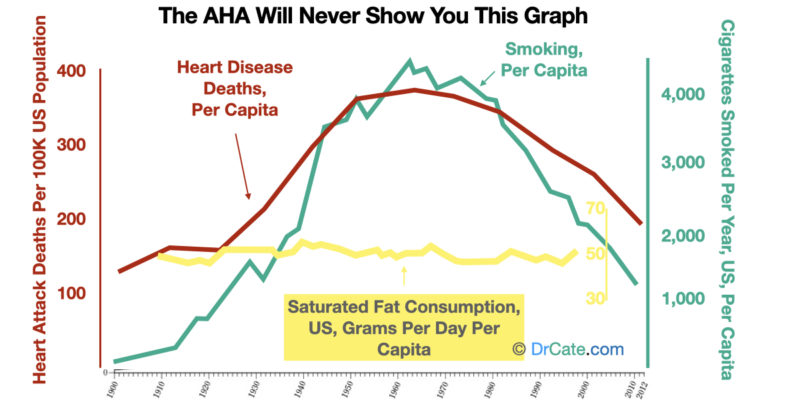
Cholesterol: What the American Heart Association is Hiding from You (Part 3)
Table of Contents
- To Hide the Facts About Fat, the AHA and Ancel Keys Hid Smoking Data for 25 Years
- How Keys and the AHA Kept the Truth about Heart Attacks Secret for Decades
- In 1953, Keys publishes cherry-picked data and his methods are (rightly) criticized
- In 1956, the AHA said more research is needed.
- Also in 1956, the AHA launched their cholesterol deception.
- In 1958, Keys and the AHA launched a massive “study”.
- In 1961, Ancel Keys made the cover of Time, claiming that smoking did not cause heart attacks.
- Also in 1961, the AHA issued its first dietary guidelines citing data from the still barely begun Seven Country Study
- in 1968, when the smoking data was finally officially in, the AHA did not publish it
- Throughout the 70s, the Seven Country’s smoking data remained buried
- In 1971, a separate study, Keys data supposedly showed smoking had no effect on heart attacks.
- In 1981, deaths caused by cardiovascular diseases fell below 50 percent of deaths from all causes for the first time since 1949.
- in 1985, the AHA finally takes a stand against smoking.
- In 1994, the data from The Seven Countries Study was published in book form.
- Confirmation Bias or Foul Play?
- Why Single Out Ancel Keys?
Today’s article is the third in a series of three. I intend to expose the cholesterol deception, the real truth about the cause of heart disease, and the American Heart Association’s role in hiding the truth from the American public. This includes doctors, patients, and everyone else. I hope this story convinces you that the AHA does not have your best interests at heart and that if you are interested in avoiding heart attacks and strokes, the last place you should turn to for advice is the AHA. I also hope that doctors who now follow the AHA’s advice around atherosclerosis prevention and treatments will start to understand why some of their colleagues have dug deeper to find the truth.
This article is continued below...(scroll down)
To Hide the Facts About Fat, the AHA and Ancel Keys Hid Smoking Data for 25 Years

In the 1950s, Keys and the American Heart Association initiated The Seven Countries Study, which was in effect an elaborate, expensive charade to create the appearance that they were making a good faith effort to isolate the cause(s) of deadly heart attacks.
They discovered strong indications early on that it was cigarettes. But instead of publicizing the correlation, they claimed more study was needed regarding cigarettes. Meanwhile, they were much more certain about the health hazard presented by saturated fat, in spite of lacking good evidence to support the connection. In the 1980s, the AHA finally came around to actively warning us about smoking.
The truth is, the smoking correlation was the only real correlation all along. This calls to question the AHA’s decades of fear-mongering around saturated fat.
But to this day, the AHA defends the whole charade. And Harvard, Tufts, and other powerful institutions stand united on this front, continuing to tell us to eat ever more canola, soy, and other vegetable oils, even though most of our fat calories now come from these unstable, oxidation prone oils and almost none from the whole-food-based fats our bodies need.
How Keys and the AHA Kept the Truth about Heart Attacks Secret for Decades
In the 1950s, Keys was involved in a study designed to get to the root of what caused heart attacks. It was the largest study ever done at that point in time. They had a lockdown on the data and were almost entirely in control of what got published, and what didn’t. In my view, there’s little doubt that the entire thing was window dressing and that no matter what the data showed, they would continue the cholesterol deception. Period. Here’s what the record shows they did.
In 1953, Keys publishes cherry-picked data and his methods are (rightly) criticized
Keys article entitled Atherosclerosis, a problem in newer public health may be the poster child exemplifying how statisticians mess with data to get results they want to get. In it, he published a graph (depicted below) showing how much fat the average person ate in a given country and that country’s rate of heart attacks. The graph had six data points and they appeared to support Keys’ idea that the more fat people ate, the more heart attacks they got.
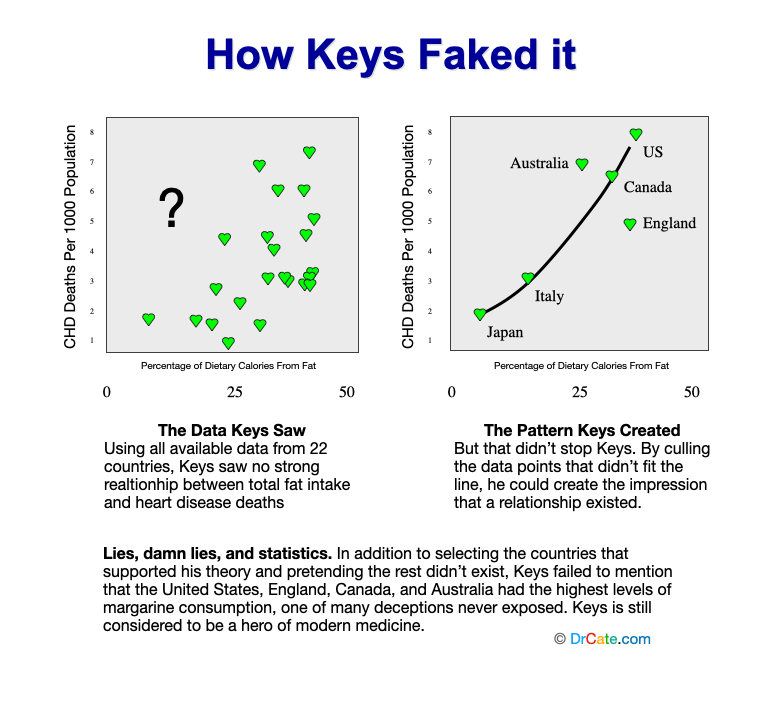
But in 1957, the study’s first critics published an article that pointed out Keys had in fact collected data from 22 countries but used data only from the six countries that supported his theory. If the accusation proved true, and no one denies that it is, that should have been the end of Keys. After all, there’s a saying about how many times you ought to let someone fool you. Don’t we have any standards in science? I believe that once someone proves they’re willing to flat out lie about matters of life and death, they’ve done us all a favor by showing they can’t be trusted to tell the truth in the future. All we have to do is pay attention.
That same year, planning begins on the study that would become the Seven Country’s Study.
In 1956, the AHA said more research is needed.
By 1956, before the Seven Countries study started, the AHA already actively downplayed the role of smoking in heart disease, claiming, “Much greater knowledge is needed before conclusions can be drawn concerning possible relationships between tobacco smoking and increased death rates from coronary heart disease.” The AHA defends this 1956 position on smoking by stating “This is an early illustration that all research and AHA statements are based on conclusive evidence.” [sources: https://professional.heart.org/en/research-programs/aha-research-accomplishments/historic-moments-and-research-funded-by-the-american-heart-association]
Also in 1956, the AHA launched their cholesterol deception.
The same year the AHA claims that there was insufficient data linking smoking to heart attacks, they asserted, “Fat and cholesterol linked” and proudly “assume a leading role in urging Americans to change their eating habits.” [source: https://professional.heart.org/en/research-programs/aha-research-accomplishments/historic-moments-and-research-funded-by-the-american-heart-association]
The troubling thing is, one would think that before advising a nation to take the extraordinary measure of abandoning the natural whole foods that had kept us healthy for centuries, the AHA would first have strong evidence linking either fat or cholesterol with heart disease. Seems little to ask from an institution that boasts of its insistence on “conclusive evidence.” The reality, however, was that although dietary fat and cholesterol were linked to each other, there was little to no credible evidence they were linked to heart attacks. The cholesterol deception was off and running.
In 1958, Keys and the AHA launched a massive “study”.
In 1958, the Seven Countries Study was launched. Among the seven countries chosen for this study were three of the original six that best fit into his theory plus four more that were not in the original 22. This study has been criticized because, during the time he surveyed people’s diets, people were not eating their habitual foods due to postwar shortages and lent. Keys’ apologists dispute this idea, of course. In my view, this investigation was not blinded and Keys’ had total control over how the data was collected and analyzed and a track record of cherry-picking, so the data quality should be viewed as questionable.
But more importantly, we shouldn’t take Keys’ word at face value when he draws conclusions from the data. Very often, where there are biases and differences of opinion between individual investigators involved in a project, the conclusions—which many people read—are not supported by the data—which fewer people ever see.
In 1961, Ancel Keys made the cover of Time, claiming that smoking did not cause heart attacks.
In his famous Time Magazine Interview, Keys claims that the newly initiated Seven Countries Study was already showing that fat is clearly more correlated with heart attacks than smoking.
Importantly, the Times noted that Keys was championing a still-controversial view, “Though Keys’ theory gained sanction from the American Heart Association last month (TIME, Dec. 26), it is still questioned by some other researchers with conflicting ideas of what causes coronary disease. The main difference is that they variously blame hypertension, stress, smoking, and physical inactivity, while Keys gives these causes only minor roles.”
Also in 1961, the AHA issued its first dietary guidelines citing data from the still barely begun Seven Country Study
There were no graphs or easy to comprehend written accounts of the data available in the AHA’s guideline for the public to digest. The guideline was simply an assertion of the AHA’s claim that saturated fat and cholesterol were linked to heart attacks. Had the AHA simply provided the American people the most basic information on smoking rates, heart attacks, and saturated fat—which would have looked like the left half of the graph at the top of the post, entitled The AHA Will Never Show You This Graph—no doubt many physicians and their patients would have chosen to keep the real food and ditch the smokes.
in 1968, when the smoking data was finally officially in, the AHA did not publish it
By 1968, a decade after it’s launch in 1958, the ten-year smoking data from the Seven Countries Study was available, according to this website which states, “The 10-year follow-up data showed that smoking was associated with a higher risk of CHD [coronary heart disease] mortality in countries where there were enough events for analysis and the strongest associations were observed in northern Europe where CHD was highest.” In other words, the evidence linking smoking and heart attacks was rock solid. But I find no evidence the AHA published this potentially life-saving information before 1980.
Throughout the 70s, the Seven Country’s smoking data remained buried
Keys collected data on smoking but none of the Seven Countries Study publications focused on smoking throughout the 1950s, 60s and 70s. The website devoted to celebrating the accomplishments of the Study does not celebrate how Keys’ helped bring this information to light. In fact, they only hint that he even collected smoking data: “When the Seven Countries Study started in 1958 the prevalence of smokers was very high and ranged from 44% in Belgrade professors in Serbia to 78% in fishermen from Ushibuka in Japan.”
In 1971, a separate study, Keys data supposedly showed smoking had no effect on heart attacks.
Published in 1971, entitled Mortality and Coronary Heart Disease Among Men Studied for 23 Years, the study evaluated 20 variables for an association with heart attacks. Keys, the lead author, concludes “Smoking and relative weight seemed unimportant.”
In 1981, deaths caused by cardiovascular diseases fell below 50 percent of deaths from all causes for the first time since 1949.
The smoking rates also declined while saturated fat intake changed little.
in 1985, the AHA finally takes a stand against smoking.
The AHA releases recommendations for policies to work toward a smoke-free generation by 2000. Their own website puts off until 1988 any significant stand against cigarettes.
In 1994, the data from The Seven Countries Study was published in book form.
I expected this book would contain the actual data, including graphs and useful easy-to-read information. It does not.
I did not expect to find internally contradictory statements like the two highlighted in the image. One, plainly states that cholesterol was not a significant predictor of mortality. The other, seemingly suggests that cholesterol is the most important factor but the sentence is so long and full of jargon the exact meaning is very unclear.
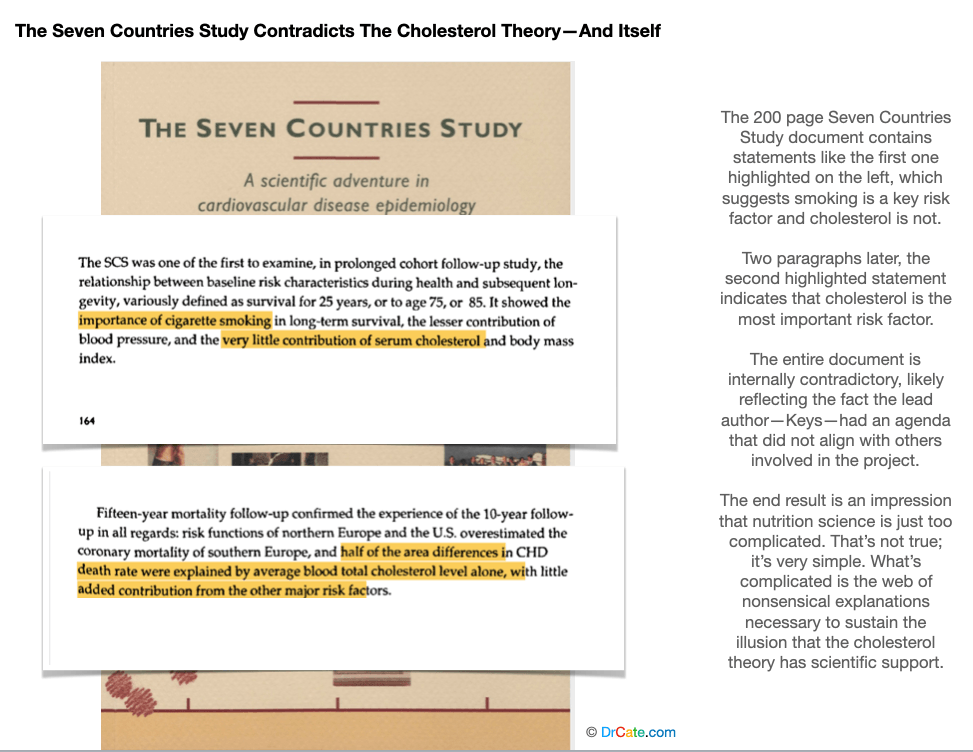
However, I shouldn’t have been surprised. There were multiple authors involved in the project and no doubt many did not agree with Keys that cigarette smoking played only “a minor role” in heart attacks. Apparently, some of them insisted their voice be heard.
Unfortunately, the website dedicated to the Seven Countries Study excludes these voices, and there is almost nothing said about the role of smoking.
Confirmation Bias or Foul Play?
Apologists for Keys and the AHA chalk up their continued misinterpretation of their own and other’s data to confirmation bias. Confirmation bias is a result of our natural tendency to search for or interpret information in a way that confirms our biases and preconceptions. It’s basic human psychology. And it’s actually not all bad; it’s nature’s way of reaffirming our experiences and helping us learn. But it’s not a good thing for scientists to indulge in. It’s much easier to try to cram new data into a flawed theory than it is to come up with new theories or admit your ideas were wrong, so it happens all the time. Confirmation bias is probably the number one reason for scientific errors involving misinterpreting data.
The Cholesterol Deception is Intentional
If that’s all there were to it, then Seven Countries Study should be seen as the poster child of confirmation bias. But there’s more to it than that. The idea that it’s just confirmation bias asks us to ignore another aspect of human psychology, greed. Given that the AHA owes its status to the fact that companies selling vegetable oil gave them millions of dollars, it’s beyond naive at this point to continue pretending that the AHA is looking out for our welfare.
In my view, the fact that Ancel Keys included cigarettes in his military meal (the K-Ration, K for Keys) combined with the fact that he had a massive ego and his infamous 6 countries study makes him literally the poster child* of dishonest nutrition scientists, lead me to believe that simple confirmation bias may have been the issue with a few, but for Keys, it was garden variety, ego-driven fraud. [*Google an image search for “nutrition study scientific fraud” and Key’s six countries data comes up in the top row.]
Why Single Out Ancel Keys?
Keys apologists have told me it’s unfair to criticize the scientific integrity of anyone who isn’t alive to defend themselves. Poppycock. First of all, if any of the Ancel-Keys defenders would like to take me on, name the time and place. Secondly, there are plenty of dead people in our history who have earned our criticism and ire. What’s more, Keys’ assertions are alive and well. It is the life’s blood beating through the machinery of the American Heart Association who still benefit by citing his work. Thanks to the multiple tricks Keys used to fool the cardiologists of his day, American physicians still recommend polyunsaturated fats and are unknowingly putting their patients at risk of death and disability. This is why every doctor should learn the truth about Ancel Keys’ experiments.
Notice I’m not giving you a lot of numbers. I haven’t said your HDL should be X or your LDL should be Y, although I do privately have personalized discussions with my patients because biomarkers can, when interpreted properly, help give you insights into the current state of your metabolism. An honest nutrition message is simple. If you’re following a low-PUFA lifestyle and the other advice in Deep Nutrition and FATBURN Fix, you don’t need to worry about cholesterol going up or increasing your chance of getting a heart attack. Get Ancel Keys and the AHA out of your head, out of your heart, and out of your diet. If you can do that, then we will have finally put Dr. Keys to rest.
- Featured Image Sources: Heart disease data from https://www.amjmed.com/article/S0002-9343%2814%2900354-4/fulltext
- Smoking data from https://www.nap.edu/read/11795/chapter/4#42
- Saturated fat data from “Nutrient Content of the U.S. Food Supply, 1909-2010″
Photo credit
- Cigarette Photo by Mathew MacQuarrie
Please note: Please do not share personal medical information in a comment on our posts. It will be deleted due to HIPAA regulations.
This Post Has 11 Comments
Note: Please do not share personal information with a medical question in our comment section. Comments containing this content will be deleted due to HIPAA regulations.
















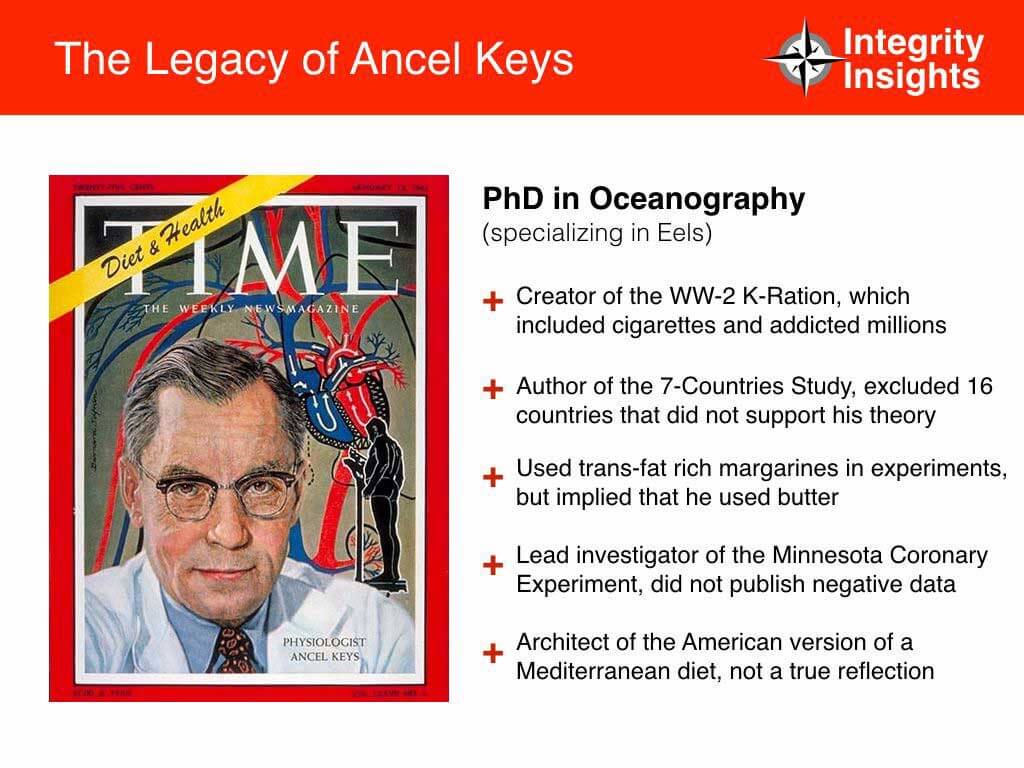

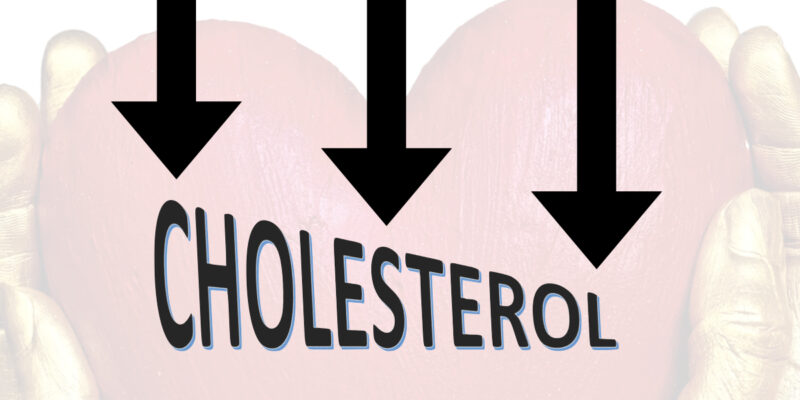

Very interesting series. I’ve looked at the research on both sides of this and have concluded that PUFA is not good for humans. Recently finished Dr. Kendricks book “the Clot Thickens” and it makes a good case for embolisms not oxidized LDL.
Im not sure where AHA gets their halo of benevolence from but urge folks to not contribute or participate in any of their activities. If sufficiently motivated write to their sponsors and do not use their products either.
I forgot to mention that I appreciate Dr. Shanahan’s courage in standing up to the AHA and bad science in general. If only more medical professionals would take the time to examine their beliefs.
The AHA recommends 2 servings of fatty fish per week.
https://www.ahajournals.org…
“Any attempt to reduce total fat intake must, then, begin with cooking fats and oils.”
– Ancel Keys in Atherosclerosis a newer problem in public health
Sounds like you agree with the arch villain of the low carb movement on that.
58 page rebuttal of various critiques by the investigators of the Seven Countries Study, which includes some of the disinformation in your post: https://truehealthinitiative.org/wp-content/uploads/2017/07/SCS-White-Paper.THI_.8-1-17.pdf
The article in Time magazine isn’t an interview. There is only one sentence on smoking.
Keys A, Taylor HL, Blackburn H, Brozek J, Anderson JT, Simonson E.
Mortality and Coronary Heart Disease Among Men Studied for 23 Years. Arch Intern Med. 1971;128(2):201–214. doi:10.1001/archinte.1971.00310200037002
“Among 20 entry characteristics, three had major predictive power,
especially for CHD death or infarction: cold pressor test, a high level
of serum cholesterol, and systolic blood pressure” As a physician do you tell your patients not to care about their blood pressure?
Pretty sure Ancel Keys’ research is not going anywhere.
Apparently you have not read this rebuttal paper carefully. This is the paper that contains misinformation. It’s a white paper, not a research paper, and has not been peer reviewed. This paper is a total waste of time. I wonder how much they were paid to write this garbage.
Yes, thank you for pointing this out. And the authors are career apologists for the seed oil industry. Henry Blackburn was a personal friend of Keys.
Is it bad to roast seeds and nuts? For example, almonds?
Hi Dr. Cate, I’m a big fan of Deep Nutrition – thank you so much for writing it. I’ve never had so many aspects of health and nutrition spelled out in such a clear, descriptive and scientifically-steeped way. With these foundations in mind, do you have any advice for applying the four pillars to patients with gastroparesis, in which processing fats and fiber can prove particularly difficult? I’m curious how to align with the human diet and not trigger other issues.
What prenatal vitamin do you recommend and do you recommend DHA supplements?
No but it does mean that the cooking method makes a difference. Don’t cook to a crisp.
Does this mean that salmon and other fatty fish should be avoided or, at best, eaten sparingly?